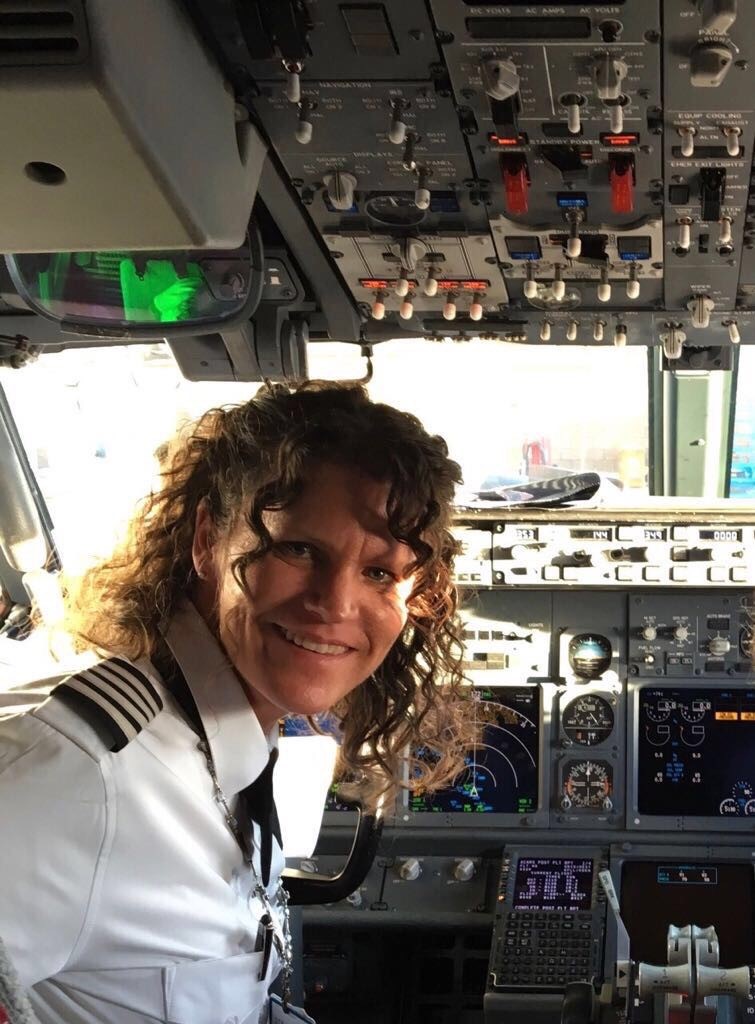
For our August 12 ZOOM meeting, RCFC Evening Club member and Southwest Airline pilot Holly Petitt joined us via smart phone on her way to DIA where she was scheduled to fly one of SW Airline’s 737s to California. After her live introduction, we watched her PowerPoint presentation, including her recorded remarks, all prepared ahead of time in case her flight schedule precluded her joining us at all. View the Meeting/Presentation recording at
https://us02web.zoom.us/rec/share/u9BEKZLO6WZOH4HM0m_QYaVmG6nLT6a80SMf__YJykiBxhQDRx5aJ_JkuJnrGBzk
She started by summarizing her career. In 1998, as a United Airlines flight attendant, she accompanied a ferry flight (moving the plane from one location to another with no passengers) sitting in the jump seat in the cockpit. Watching the pilots do their business energized her to work toward becoming an airline pilot herself. She learned to fly at the Fort Collins/Loveland airport. With all of her necessary qualifications and certifications, she got a job with Great Lakes Airline flying a Beechcraft 1900 turboprop. She was one of four Great Lakes pilots certified to land in Telluride airport, the highest in the US. In June, 2004, she accepted a job with Southwest Airlines, getting promoted to Captain in 2013. She still gets goosebumps taking off and landing.
The arrival of the Boeing 737 Max 8 aircraft, with new fuel-efficient engines, upgraded avionics and enough similarity to older 737s to allow pilots to fly all vintages was an exciting event. However, two Max 8 crashes in five months, killing some 346 people, led to questions about the plane’s design, training standards, pilot experience, and regulatory oversight. Ultimately, here, as with most airplane crashes, the cause is a chain of unfortunate events, the disruption of any one of which would probably have saved the situation. In this case, the anti-stall system (MCAS), designed to keep the nose of the plane from going too high on takeoff, and which was designed such that if one sensor recognizes a problem the system is activated, failed. This system was not included in the training manual or in Boeing training for the plane as it was designed to operate in the background; pilot corrective measures were essentially the same as for previous attitude control systems. Significantly, SW Airline standards of training and maintenance were sufficiently high that no incidents with this system were encountered.
After the first crash, Boeing did not take any appropriate action. For the second crash, the captain had just been promoted to that position. Both captain and first officer had limited experience with the MAX aircraft. Also, this aircraft had had two incidents with the MCAS in the previous 72 hours but appropriate checks and maintenance were not done. Thus, the pilot was not the cause of the crash, but with better training he could have prevented it.
As for recertification of the MAX, there have been significant delays. The first re-certification flight occurred on 29 June 2020. The FAA has required several changes with the result that the MAX planes may return to service in early 2021. In the meantime, the airlines are battling potential customer concerns. As a minimum, they are expected to offer free flight changes for those concerned about flying on MAX in the future. Holly contends that the MAX, with appropriate training and maintenance, was safe to fly before the crashes and will be safe to fly in the future.
All of this has been overshadowed by the advent of Covid-19 and its dramatic impact on the airline industry. At its worst, commercial flying was down by 95%; all airlines are suffering huge losses (in June, SW was losing $16 million per day). Some regional airlines have gone out of business; some major airlines have furloughed employees; pilots are flying reduced schedules; all airlines are restructuring how passengers are managed. Southwest now requires that all passengers and crew wear snuggly fitting masks (passenger cooperation has been very high); that boarding be accomplished with appropriate social distancing; that all middle seats be blocked; that all planes be thoroughly cleaned between flights, and even more completely daily, with a thorough electrostatic anti-microbial treatment every 30 days.
After her presentation, Holly had the opportunity both to play up her Rotary-supported service in Mali, Africa, “Africa Pads”, and to give us a brief tour of her plane for the day while she did her pre-flight check outside the plane.